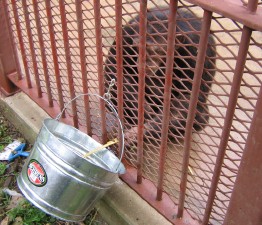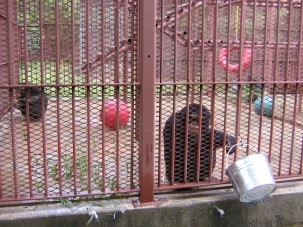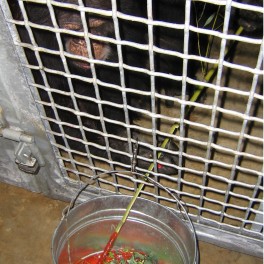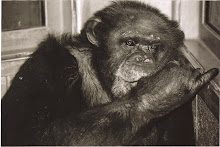Food Enrichment!!
 Everybody knows how smart chimpanzees are and the former OSU chimps, because of their enculturated upbringing and cognitive training, are smarter than most other chimps. Being left alone with nothing to do and no enrichment was particularly harmful to them, but not just them. All the chimpanzees kept at PPI were harmed by being neglected and kept in environments without any enrichment. The conditions at PPI, before the AG stepped in, caused both physical and psychological suffering to these highly sensitive great apes.
Everybody knows how smart chimpanzees are and the former OSU chimps, because of their enculturated upbringing and cognitive training, are smarter than most other chimps. Being left alone with nothing to do and no enrichment was particularly harmful to them, but not just them. All the chimpanzees kept at PPI were harmed by being neglected and kept in environments without any enrichment. The conditions at PPI, before the AG stepped in, caused both physical and psychological suffering to these highly sensitive great apes.Now all of the chimps at PPI get food enrichment. Every day they are given “forage” which allows them to simulate natural food gathering activity. The OSU chimps have “dippy buckets" again (Ivy, Keeli, and Darrell are pictured here with their buckets).

In 1985, the US Congress passed an amendment to the Animal Welfare Act that required that captive primates be kept in environments that promoted their “psychological well-being." In the last 20 years, there has been a lot of work done to devise ways to enrich captive environments to promote primate mental health. Sanctuaries, zoos, and even biomedical research facilities have created enrichment programs to minimize boredom, frustration, aggression, and depression. Chimpanzees prefer to work for food rather than receive identical food day in and day out. Food enrichment provides chimps with a small sense of control over their captive environments and this is important to their overall well-being.

PPI, unlike most places where captive chimps are kept, denied the chimpanzees even this small dignity.


2 Comments:
I am so glad something was finally done, I have been following this from the beginning and as a cognitive reseacher am aware of how stressful this would have been on enculturated apes and Sally and the caregivers.
I would be there to clean and help in a shot if I wasn't in Australia.
PPI, unlike most places where captive chimps are kept, denied the chimpanzees even this small dignity.
Give me specific examples so I can use against Tellos and Feral (and for that matter, Yonushonis and Holland.)
-Ben Bayliss
Post a Comment
<< Home